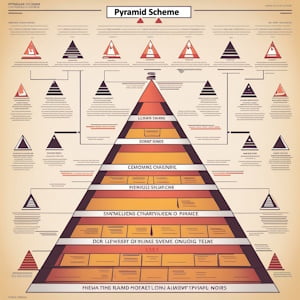Introduction: Understanding Affiliate Marketing
Affiliate marketing is a legitimate business model that has been around for decades. It is a performance-based marketing strategy where individuals or businesses earn a commission by promoting products or services of other companies. Unfortunately, there is a common misconception that affiliate marketing is synonymous with pyramid schemes. In this article, I’m going to debunk this myth and explain the truth about affiliate marketing.
The Difference Between Affiliate Marketing and Pyramid Schemes
Before we jump into the intricacies of affiliate marketing, it is crucial to understand the fundamental differences between affiliate marketing and pyramid schemes. While both involve earning money through referrals, the key distinction lies in the structure and sustainability of the business model.
It may seem that – if I’m showing you how to do the same thing that I’m doing in order to make money, that this must be some sort of pyramid scheme… right?
But in a pyramid scheme, the primary focus is on recruiting new members into the scheme with the promise of high returns. The emphasis is on building a hierarchical structure where the person at the top benefits the most, while those at the bottom struggle to make any profit. On the other hand, affiliate marketing operates on a performance-based system, where commissions are earned through actual sales or leads generated. There is no recruitment involved, and success is based on the quality of the marketing efforts.
The money I earn has nothing whatsoever to the money *YOU* earn. In a true pyramid scam, I can only earn money when you make sales.
How Affiliate Marketing Works
Affiliate marketing relies on the concept of revenue sharing. When you sign up as an affiliate marketer, you are provided with a unique affiliate link or code that tracks your referrals. You can promote this link through various channels, such as websites, blogs, social media, or email marketing.
When a person clicks on your affiliate link and makes a purchase or performs a desired action, such as submitting their email address, you earn a commission. The commission percentage varies depending on the affiliate program and the type of product or service being promoted. The key to success in affiliate marketing lies in effectively promoting the products or services to a relevant audience and driving conversions.
Debunking the Pyramid Scheme Myth
One of the most common misconceptions about affiliate marketing is that it is a pyramid scheme in disguise. This myth stems from the fact that both pyramid schemes and affiliate marketing involve earning money through referrals. However, as I said above… the key difference lies in the structure and sustainability of the business model.
In affiliate marketing, the focus is on promoting products or services that provide genuine value to the customers. The commissions earned are a fair reward for the marketing efforts put in. Unlike pyramid schemes, affiliate marketing does not require constant recruitment or the reliance on a hierarchical structure to generate income. Affiliate marketers can earn money through their own efforts without needing to recruit others.
I’m showing you how to do what I do – but my success has no reliance whatsoever on YOUR success.
Key Characteristics of Affiliate Marketing
To further understand the legitimacy of affiliate marketing, let’s explore some key characteristics that distinguish it from pyramid schemes:
- Product Focus: In affiliate marketing, the main objective is to promote products or services that solve a problem or fulfill a need. The focus is on delivering value to the customers, rather than solely recruiting new members.
- Performance-Based: Affiliate marketers are rewarded based on their performance. The commission they earn is directly proportional to the sales or leads they generate. This ensures that income is derived from actual sales, rather than the recruitment of new members. If I don’t offer *YOU* the information and products you need to succeed, I will not make any money.
- Transparency: Legitimate affiliate programs provide transparency in terms of commission rates, terms, and conditions. There are no hidden agendas or misleading promises of high returns without effort. (At least, I hasten to add, in legitimate affiliate marketing – there are, as in all fields, some people willing to scam you!)
Benefits of Affiliate Marketing
Affiliate marketing offers several benefits to both the marketers and the companies they promote. Let’s explore some of the advantages of this business model:
- Low Startup Costs: Starting an affiliate marketing business requires minimal investment. You can join affiliate programs for free and promote products without having to worry about inventory, shipping, or customer support. Indeed, you can start affiliate marketing with no money at all… although there are some disadvantages! (See this post for more information)
- Flexibility and Freedom: Affiliate marketing offers the freedom to work from anywhere and at any time. You have the flexibility to choose the products you want to promote and the strategies you want to implement. Perhaps you’ve heard of “digital nomads,” people who live in Thailand, Philippines, Japan, or other exotic places, earning their income with merely an Internet connection…
- Passive Income Potential: Once you have established your affiliate marketing channels, such as a successful blog or social media presence, you can earn passive income. This means that you continue to earn commissions even when you are not actively promoting the products.
Common Misconceptions about Affiliate Marketing
Despite its legitimate nature, affiliate marketing is often misunderstood. Let’s debunk some of the common misconceptions surrounding this business model:
- Quick Riches: Affiliate marketing is not a get-rich-quick scheme. It requires time, effort, and consistent marketing strategies to build a successful business. More scams rely on fooling you into believing that there’s a “lazy” or “quick” way to great fortunes.
- No Need for a Website: While it is possible to promote affiliate products without a website, having a dedicated platform, such as a blog or a landing page, can significantly enhance your chances of success. More detail here.
- Overnight Success: Building a profitable affiliate marketing business takes time. Success is not achieved overnight but through continuous learning, testing, and refining your strategies.
Real-Life Success Stories in Affiliate Marketing
- Pat Flynn: Pat Flynn is a renowned affiliate marketer who has built a successful online business through his blog and podcast. He shares his journey and strategies to inspire aspiring affiliate marketers.
- Alston Godbolt: The famous “I tried it” guy on Youtube. Although a successful affiliate marketer in his own right, he likes to test the affiliate marketing scams listed on Youtube, and showing you the results.
- Michelle Schroeder-Gardner: Michelle Schroeder-Gardner is another notable affiliate marketer who has achieved financial independence through her blog. She shares her income reports and provides valuable insights for those starting in the field.
- Adam Enfroy: You can see his story on Youtube – a very successful affiliate marketer making over $100,000 every single month!
How to Get Started in Affiliate Marketing
If you are interested in venturing into affiliate marketing, here are some steps to get started:
- Choose Your Niche: Select a niche that aligns with your interests and expertise. This will help you establish credibility and connect with your target audience. I recommend only two – see here for my recommendations.
- Research Affiliate Programs: Identify reputable affiliate programs that offer products or services relevant to your niche. Research their commission structures, payment methods, and promotional resources. Amazon and Clickbank are good starting platforms.
- Create Valuable Content: Develop high-quality content that educates, informs, or entertains your audience. This can be in the form of blog posts, videos, or social media content. Focus on providing value and building trust with your audience. By creating content, you attract traffic – which you can then use for affiliate marketing or advertising.
Tips for Success in Affiliate Marketing
To maximize your success in affiliate marketing, consider implementing the following tips:
- Know Your Audience: Understand your target audience’s needs, preferences, and pain points. Tailor your content and promotional strategies accordingly to resonate with them. My own audience that I market to is those of you who are retiring, and would prefer more income than your savings & Social Security can provide.
- Build Relationships: Establish strong relationships with your audience and fellow affiliate marketers. Collaboration and networking can open doors to new opportunities and increase your reach.
- Track and Analyze: Regularly monitor your affiliate marketing performance and track the effectiveness of your promotional strategies. Use analytics tools to gain insights and make data-driven decisions.
Conclusion: The Truth about Affiliate Marketing
In conclusion, affiliate marketing is a legitimate and lucrative business model that should not be confused with pyramid schemes. It operates on the principles of promoting valuable products or services and earning commissions based on performance. By understanding the key characteristics, benefits, and misconceptions of affiliate marketing, you can start building an affiliate marketing website. Remember, it takes time, effort, and dedication to build a thriving affiliate marketing business, but the rewards are well worth it.










